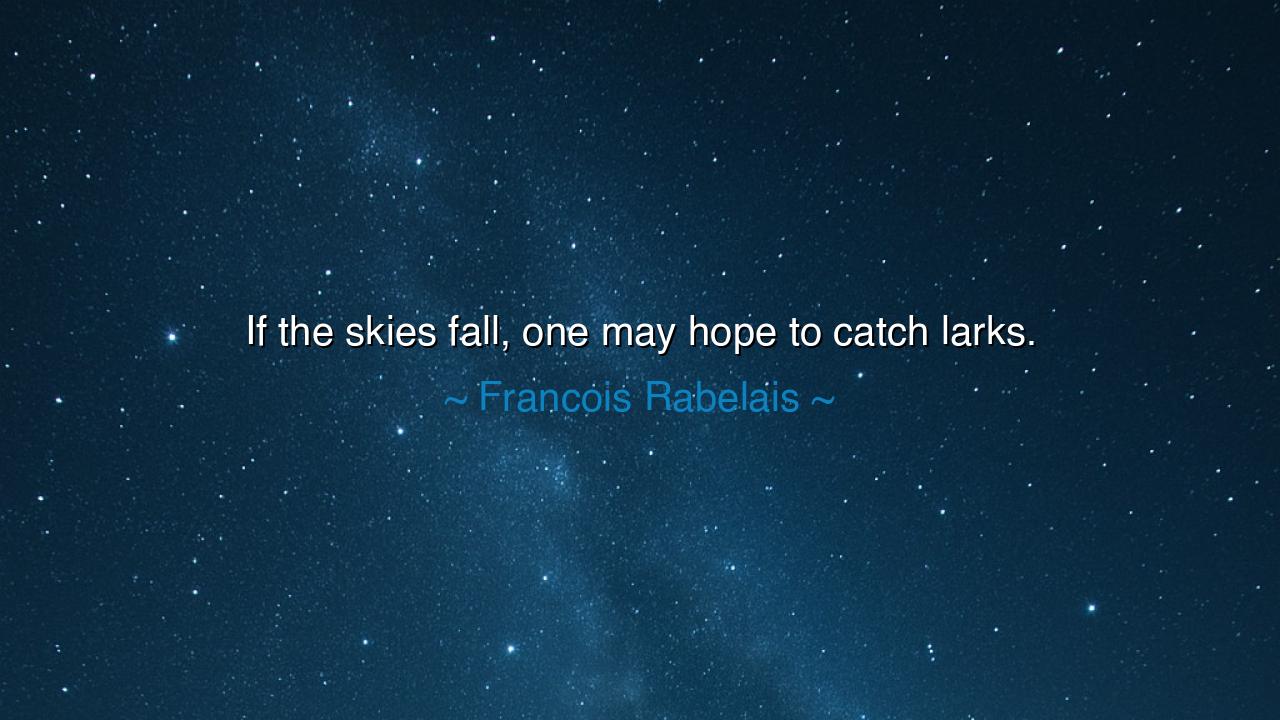
If the skies fall, one may hope to catch larks.






“If the skies fall, one may hope to catch larks.” — thus wrote François Rabelais, the bold and irreverent sage of the French Renaissance, whose laughter was edged with truth and whose humor carried the weight of philosophy. Beneath the playfulness of this proverb lies a wisdom both ancient and enduring: that even in the face of calamity, the human spirit finds a way to imagine hope. It is a jest and a revelation in one breath — for when Rabelais speaks of the skies falling, he names the impossible, and yet, even in that chaos, he dares to look upward and dream.
To the ancients, this phrase would have sounded like a paradox — a union of absurdity and optimism. For what could be more ruinous than the heavens collapsing, the very firmament tearing apart? And yet, Rabelais tells us that if such a disaster were to come, we might still “catch larks” — small birds of song and joy. Thus, from destruction, he draws delight; from the unimaginable, he conjures opportunity. This is not mere foolishness, but philosophical resilience — the art of seeing possibility where others see only doom. It is the laughter of wisdom, not of ignorance.
Rabelais lived in a turbulent age — an era of religious wars, censorship, and plague. The Renaissance was both a dawn and a storm, where old certainties crumbled and new ideas shook the earth. Men of faith and intellect feared the skies might indeed fall upon them, as authority and truth were torn apart. Yet Rabelais, physician and humanist, mocked despair itself. His words remind us that when the world trembles, one must not surrender to fear; one must search even in disaster for the seeds of renewal. To “hope to catch larks” is to believe that every collapse hides a gift — if one is wise enough to look for it.
Consider, for example, the story of Sir Isaac Newton, who, during the Great Plague of London in 1665, fled to the countryside to escape contagion. There, isolated and uncertain, he began to think, to experiment, to dream. And in that time of fear and death, he discovered the law of gravity — the invisible harmony that holds the universe together. Thus, while the skies seemed to fall over England, Newton indeed “caught larks.” His discovery was the very fruit of adversity. In him, Rabelais’s wit becomes prophecy — that from the collapse of one order can arise the dawn of another.
The meaning of this quote reaches beyond humor into the realm of courage. It tells us that catastrophe does not erase possibility — it merely transforms it. The wise man, when the heavens darken, does not lament, but adapts. He looks not for safety but for meaning. In the ruin of plans, he seeks the hidden lark — the small, bright chance that sings amid the wreckage. For life is ever-changing, and those who cling only to what was will be crushed beneath the falling sky. But those who move with the storm may yet rise with its winds.
The lark, in ancient lore, was the bird of morning — a herald of light, of song, of renewal. To “catch larks” as the sky falls, then, is to claim hope in the darkest hour, to gather beauty even as the world seems to end. It is the same spirit that made the Stoic philosophers say, “The obstacle is the way,” and the same wisdom that carried poets through war and exile. For destruction and creation are brothers — one clears the ground for the other to bloom. The fall of the sky, terrible as it may seem, may yet open new horizons for the soul that endures.
So, my listener, take this teaching to heart: when calamity descends, do not surrender your laughter. Let your hope be not naïve, but defiant. When the sky falls, when all certainties collapse, stand firm and look upward — for even then, larks may fly above the ruins. Seek the good hidden within the chaos, the lesson within the loss. Remember that those who despair see only the fall, but those who are wise see also the wings. As Rabelais taught, wisdom is not the absence of fear, but the ability to smile through it — to believe that even as the heavens crumble, life still sings.






AAdministratorAdministrator
Welcome, honored guests. Please leave a comment, we will respond soon